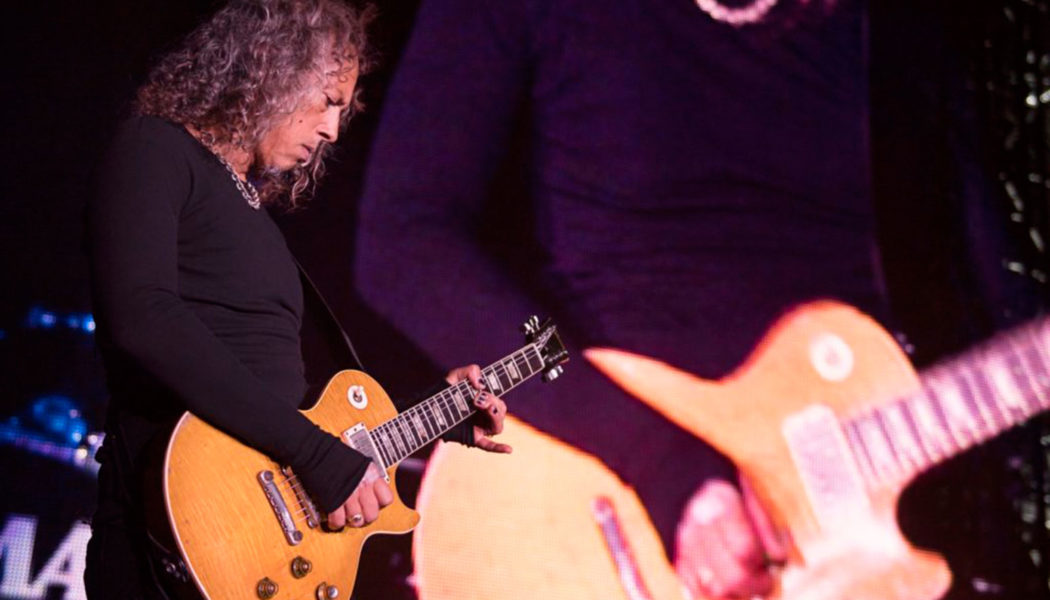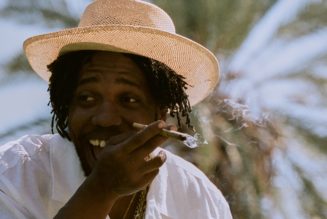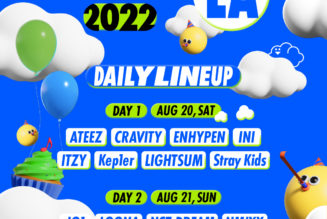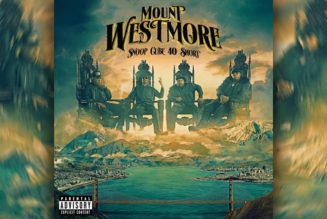As a member of Metallica for nearly 40 years, Kirk Hammett is one of the most accomplished and influential lead guitarists in hard rock. Even so, he’s about to venture into uncharted territory: On April 23, he’ll release Portals (via Blackened Recordings), his debut solo EP.
“Part of the reason for Portals is, there’s always been a musical side to me that was much bigger than what people see in Metallica,” Hammett tells Billboard during a phone chat from his Hawaii home. “I’m way into all sorts of music: jazz, blues, country, classical, reggae. I’ve been a music fan for so long, and I’ve learned to play all different sorts of styles. So this is a way for me to show that.”
Still, Hammett admits, releasing this EP on his own, as opposed to having input and support from bandmates, is “like traveling in the dark, and I hope I make it to the destination!” he says with a laugh.
“I’m nervous. I’m just like anyone else: I’m afraid that it might fall flat on its back in certain respects. But at the end of the day — and I say this about all the Metallica albums, too — I just went in there with the best of intentions. I did the best I possibly could over every aspect of this album, and made sure that this is an accurate snapshot of where my musical head is right now.”
[embedded content]
Instead of the heavy riffs for which he’s renowned, Portals features four cinematic instrumental songs. Steering clear of his usual style, Hammett says, was his way of trying to reach people on a different level than he has done with his band work. “I’m all about consciousness-expanding through the mind — and I’m not talking about psychedelics,” he says. “I call this music ‘audio cinematic.’ Hopefully, it inspires the listener to fill in the visuals in their mind to go along with what they’re hearing. That was the whole intent on all this material.”
Initially, Hammett hadn’t intended to create a solo release. He first started work on the music in 2017, when he held exhibitions in Massachusetts and Toronto to showcase his extensive horror movie poster collection, and he wanted to create background music to be played over the sound systems to enhance the attendees’ experience. When he sat down to write, though, it quickly turned into something much bigger. “Five or six hours later, I was knee deep into this piece of music and seeing all these possibilities,” he says. That first song eventually became “Maiden and the Monster,” the opening track on Portals.
But Hammett still wasn’t thinking that it would turn into a full-blown solo project. That changed when, in 2019, Metallica performed a pair of S&M2 concerts in San Francisco to celebrate the 20th anniversary of the original concert event, where the Bay Area heroes collaborated with the San Francisco Symphony Orchestra. (The S&M2 shows were recorded and released as a live package in 2020.)
Hammett had befriended the orchestra’s conductor, Edwin Outwater. Realizing that what he was writing wasn’t suitable for Metallica, he shared the material with Outwater instead. Outwater was impressed with it, and he and Hammett ended up collaborating on two tracks for Portals: “The Incantation” and “High Plains Drifter,” the EP’s first single.
Portals also features legendary producer Bob Rock as a guest artist, but Hammett felt comfortable producing the EP himself. “I’m only doing what I to know from experience from making so many Metallica albums and being in the studio for thousands and thousands of hours. When I go into that recording situation, I instinctively know what to do because I’ve done it so much,” he says. (The release also features drummers Jon Theodore and Abraham Laboriel, bassist Greg Fidelman and arranger Blake Neely.)
When COVID-19 restrictions began lifting in 2021, Hammett’s work with Metallica resumed, “so all my energies went into that direction.” (However, during the pandemic lockdown, the band livestreamed an acoustic performance that benefited its All Within My Hands charity.) “Then I said, ‘All right, I’ll just end [Portals] here: four instrumentals, 25 minutes of music or so; that’s a good place to stop,’ ” he says. With the tracklist decided, he recorded the songs in Los Angeles, Paris and Oahu, Hawaii, fitting in sessions whenever he could with his busy schedule. “We recorded in places where I just happened to be at the time,” he recalls. “I’m glad I did it — it documents my musical feelings and sentiments during that time. I always think that’s important.”
Although he knows fans will likely pay attention to this EP because of his high profile with Metallica, Hammett is modest with his expectations for it. “I’m putting this album out, and there’s actually no guarantee that it’s ever going to be successful,” he says. “I’m putting it out for the love of music, and for the integrity of it because I’m an artist and I have something to say and I want to express my creativity. I feel very fortunate to be in this situation where I can use my imagination and creativity in such a way that it really means something. I’m trying to make music that comes from a deep place that appeals to everyone else’s deep place.”
Hammett first discovered music’s powerful emotional impact when he was growing up in El Sobrante, a town in the San Francisco Bay Area. “My mom would turn on the radio in the morning and leave it on all day while she was gone, on the theory that it would keep all the burglars away,” he says. “It would just be me and my sister in the house. So I listened to a lot of radio as a kid, and I adored it all. I was like a sponge.”
He started playing guitar when he was 15 years old. He recalls: “I was instantly able to pluck out stuff and make sense of it. The hunger and the drive were there. It also calmed me down and made me feel better. It was like a form of therapy for me as a teenager. I was able to make people happy just by playing my guitar. I recognized that that was a very, very special and super-positive thing. And at one point, it was the only positive thing in my life when I was very young, so I hung on to it. It was like a lifeline to me.”
By the time Hammett was in his late teens, he was playing professionally with Exodus, the thrash metal band he had formed in high school. “We actually started getting paid to play shows. It seemed like all the sudden, I got more handsome overnight! Something happened, and all of the sudden, everyone in the band got more handsome!” He laughs, but then turns serious as he recalls how Exodus helped him grow as an artist. “All those early Exodus songs were songs that I had written. It’s a great feeling starting a song, but it’s a greater feeling finishing the song and going, ‘Yep, this is good enough to play for other people.’ ”
In 1983, Hammett left Exodus to become the lead guitarist for Metallica, replacing future Megadeth founder Dave Mustaine. Metallica has since become one of the most successful heavy metal acts of all time. The band has sold over 120 million albums globally, according to Blackened Recordings. Its repertoire includes 11 RIAA-certified multi-platinum studio albums — its 1991 eponymous set, a.k.a. The Black Album, is certified 16 times platinum in the United States alone. The quartet has also won eight Grammys and been inducted into the Rock and Roll Hall of Fame. Hammett believes that this success was possible because of their sincere approach to the music.
“I have to really be able to feel the music that I’m playing — it can’t be like an exercise or something.” His bandmates share this sentiment, though he says “it’s not like we ever sat down and talked about it. We all instinctively know when we hear a piece of music, ‘That’s a piece that needs to be worked on — we need to embrace this because it’s so impactful on an emotional level. We can turn this into something really great.’ That’s what we’ve always done.”
While Hammett makes it clear that Metallica remains his main focus, he doesn’t rule out more solo work. “I’m always sitting on a ton of material at any given point,” he says. “Maybe the next thing you might hear from me is a jazz album. Who knows? I have a lot of nervous energy, and I’ve got to always be doing something. So maybe this is the start of something. Maybe it isn’t. We’ll see!”
Hammett ended the call so that he could get back to playing the guitar, which he says he still does every day. “I’m a real habitual guitar player — and when I play, it’s pure love,” he says. “I have no agenda. I just pick it up and play from the heart. That’s where a lot of the music that I write comes from. I really think that when you play with emotion and are conscious of the intent, those factors come together to make a really powerful emotional statement.”
[flexi-common-toolbar] [flexi-form class=”flexi_form_style” title=”Submit to Flexi” name=”my_form” ajax=”true”][flexi-form-tag type=”post_title” class=”fl-input” title=”Title” value=”” required=”true”][flexi-form-tag type=”category” title=”Select category”][flexi-form-tag type=”tag” title=”Insert tag”][flexi-form-tag type=”article” class=”fl-textarea” title=”Description” ][flexi-form-tag type=”file” title=”Select file” required=”true”][flexi-form-tag type=”submit” name=”submit” value=”Submit Now”] [/flexi-form]











Tagged: bbfeature, bbnews, entertainment blog, music, music blog, Rock, Rock & Pop